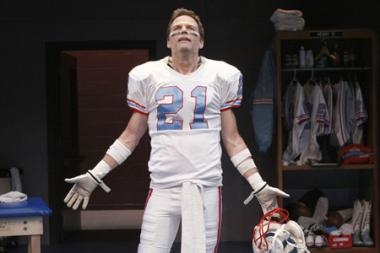I haven’t seen Runt of the Litter, but the premise is intriguing, even for someone, like me, who has zero interest in football. At heart, Bo Eason’s one-man show is that staple of sports fables, the underdog-overcomes-adversity-to-make-good story. The difference here is that Eason isn’t just the writer-performer of the piece. He’s the former football player who is the subject of his (slightly fictionalized) play.
Bo Eason grew up in the sizeable shadow of his older brother, Tony, who became a star quarterback for the New England Patriots in the ’80s. Little Bo, judged too small to compete on that violent battlefield, didn’t even make his high school team on his first tryout. But what he lacked in stature he made up for in heart and hard work, and ended up in the NFL as a defensive back for the Houston Oilers—a bona fide pro, but an unglamorous toiler on a mediocre team while his brother was leading the Pats to the 1985 Super Bowl.
Eason performed Runt of the Litter in New York in 2002 and has been touring it on and off ever since. (He’s also a motivational speaker who, according to his website, “inspires us all to make our heart and passion our biggest asset.”) His play, which visits CityStage this weekend, is part coming-of-age story, part pro sports expos? and, apparently, part revenge fantasy.
It takes place in the locker room before an NFL conference championship game, where Eason’s fictional stand-in, Jack Henry—like Eason, a safety for the Oilers—is preparing to face the juggernaut team led by his brother Charlie, “the greatest quarterback of all time.” As he dons his gladiator gear—helmet, shoulder pads, Oilers jersey—he recalls a childhood frustrated by the accolades heaped on his gifted older brother, whom he admired and resented in equal measure (and still does). And he relives the obsessive ambition that drove him to push himself through a Spartan training regimen and to shrug off injury after injury.
Eason has described the 90-minute monologue as “closer to Death of a Salesman than it is to Rocky. It’s about the cost of winning” and the brutal reality of professional sports. “When you knock someone’s teeth out, you get a pat on the back,” he says. It’s a profession that on a weekly basis brings you “face to face with your own evil.”
Notwithstanding its moral insights, the play stays true to its genre. The end point of Jack’s locker room narrative is a climactic confrontation—the game he’s waited for all his life, which here takes on almost mythic dimensions as the two brothers face each other on the gridiron. “I will spill his blood,” Jack declares. “I will color the field red with his blood and drown him in it.”
I don’t know the outcome of the fictional contest in Bo Eason’s play. I do know that Tony Eason was repeatedly sacked in Super Bowl XX, never completed a pass and was taken out in the second quarter. The Patriots lost.
Runt of the Litter: Jan. 20-23, CityStage, 1 Columbus Center, Springfield. (413) 788-7033, www.symphonyhall.com.



